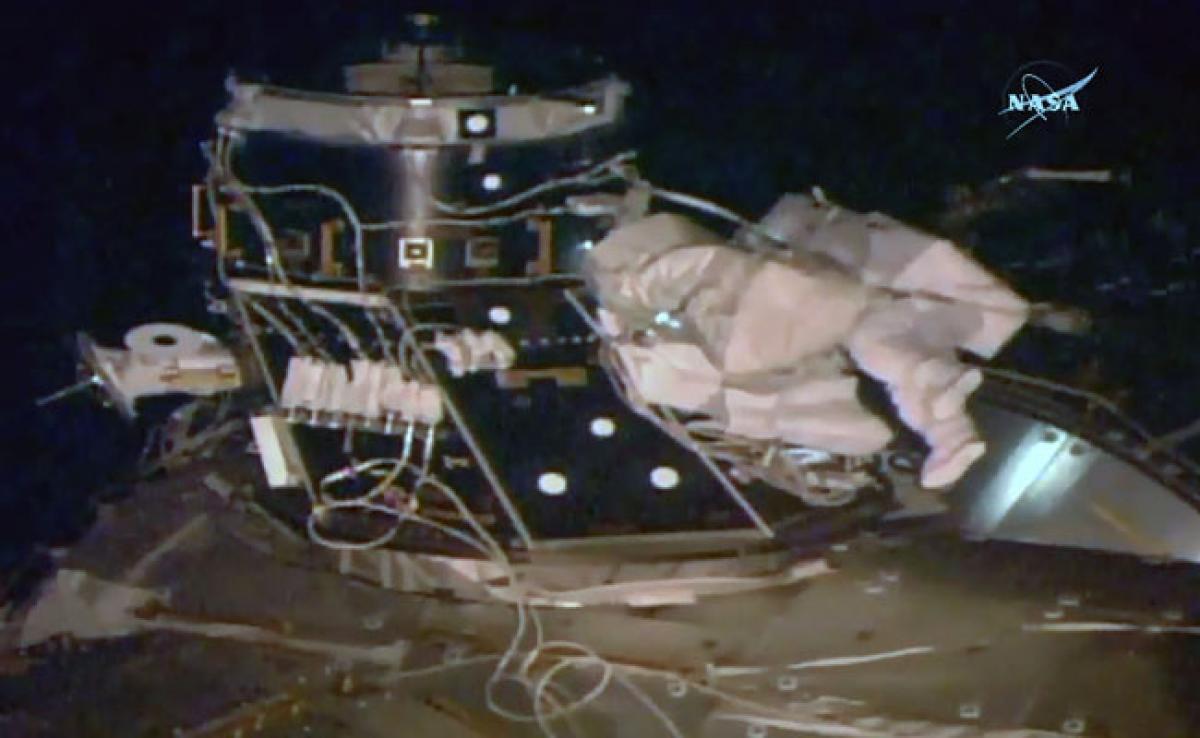Live
- Geetesh Sanodia Drives User Success with Comprehensive Training Programs Using Digital Adoption Platforms like WalkMe and Apty
- Sachin Mittal: A Journey from Entertainment to Wedding Excellence
- Bihar CM keeps up his promise, attends wedding festivities of PSO’s son in Haryana’s Rewari
- Indian Air Force Commanders’ Conference Focuses On Operational Preparedness Amid Border Challenges
- International Men’s Day 2024: Smart Gifting Ideas for Today’s Men
- Nigerian military kills scores of bandits in airstrikes: Official
- International Men’s Day: Essential Wellness Products for Today’s Men
- Rajamouli, Prasanth Varma, others Praise 'Pushpa 2: The Rule' Trailer as 'Wildfire'
- Bandhan Life Expands National Footprint with Launch in Northern India
- Transforming Enterprises across Industry Verticals with Advanced Multi-Cloud Strategies and DevOps Solutions
Just In

A space blanket floated away from American astronaut Peggy Whitson on Thursday as she made a historic spacewalk outside the International Space Station, setting a new record for the most spacewalks by a woman.
A space blanket floated away from American astronaut Peggy Whitson on Thursday as she made a historic spacewalk outside the International Space Station, setting a new record for the most spacewalks by a woman.
The crew was not in danger due to the mishap, which occurred when Whitson was trying to fold up a bulky cloth cover, known as an axial shield, and put it in a bag.
The mishap briefly raised concern at mission control in Houston that the shield might come back and hit the orbiting laboratory.
About four hours into the spacewalk, however, NASA determined that the gear had drifted a safe distance away and there was "no recontact risk," said NASA commentator Gary Jordan.
Images on NASA television showed the shield as a small white dot in the darkness.
The space blanket was designed to guard the station from micrometeoroids, and also for thermal protection.
To make up for the loss, the pair retrofitted an existing cover outside the space station to go in its place.
Historic outing
The spacewalk formally began at 7:29 am (1129 GMT) when Whitson and her NASA colleague Shane Kimbrough switched their spacesuits to battery power before venturing outside the airlock and into the vacuum of space.
"Be safe and enjoy your time out," said French astronaut Thomas Pesquet as the hatch opened and Whitson made her way out in the dark, her path illuminated by a light on her helmet.
"I will be waiting for you."
Whitson, 57, is making her eighth career spacewalk, surpassing the record of seven previously held by American Suni Williams.
During the walkabout, Whitson also beat Williams' time spent spacewalking. Williams' record was 50 hours 40 minutes.
"This is a significant milestone," said Jordan, as Whitson made it to 50 hours and 41 minutes, becoming the world's most experienced female spacewalker.
"Congratulations to Peggy Whitson."
The goal of the six-and-a-half hour spacewalk was to continue upgrading the International Space Station for the arrival of commercial spaceships in the years to come.
SpaceX and Boeing are currently designing crew vehicles that will begin flying people to the ISS as early as next year.
Space experience
Whitson earned a doctorate in biochemistry and served as the first female space station commander in 2008.
She is a native of Iowa and is known for her quick wit, sense of humor and ease in communicating complicated science topics to a lay audience.
Earlier this month, she said in an interview on NASA television that she has spent her time at the orbiting lab growing stem cells for a science experiment on cell therapies for cancer.
She is also taking part in experiments to test how fire acts in microgravity to better understand how it spreads in space, and growing seedlings called Arabidopsis to study how plants grow in orbit.
Now on her third long-duration spaceflight, Whitson is the oldest woman to ever fly in space.
She arrived at the space station in November, after previously serving on two six month missions at the orbiting outpost in 2002 and 2008.
On April 24, she will break another record -- this time for the most cumulative days in space by an American -- when she passes 534 in orbit, longer than current title holder Jeff Williams.
Active on her Twitter account, @AstroPeggy, Whitson often writes about how research at the space station relates to everyday life, and how she travels the world as part of her astronaut training.
"I traveled to Russia eight times in the last 1.5 year training flow, two times to Japan and one time to Cologne," she wrote in a recent blog post.
Next week, she and Pesquet, 39, will perform another spacewalk to continue the space station upgrades and maintenance needed for future spaceships.
For part of the outing, Pesquet is scheduled to ride the robotic arm from part of the football field-sized lab to another.
"We call that officially the yee-haw ride," Whitson told NASA television last week.
Whitson is married to fellow NASA biochemist Clarence Sams.
According to her NASA bio, her hobbies include weightlifting, biking, basketball and water skiing.

© 2024 Hyderabad Media House Limited/The Hans India. All rights reserved. Powered by hocalwire.com







